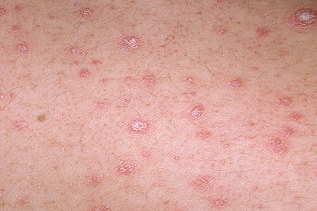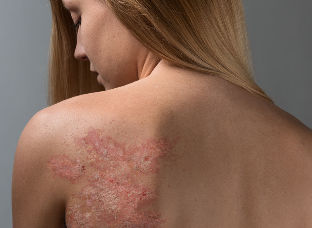
From psoriasis suffer about 4% of the population of the globe. It can develop at any age from birth to a ripe old age, but the most psoriasis "loves" for the young. This is evidenced by the fact that 70% of patients get sick psoriasis at the age of 20 years.
Symptoms of psoriasis: itching, rash, peeling
Who to contact: doctor-dermatologist
Tests and examinations: biopsy of the skin
Therapy: cryotherapy, PUVA-therapy, plasmapheresis
Psoriasis – a chronic non-communicable diseases, which are most often manifested in the form of rashes and peeling of the skin.
From psoriasis suffer about 4% of the population of the globe. It can develop at any age from birth to a ripe old age, but the most psoriasis "loves" for the young. This is evidenced by the fact that 70% of patients get sick psoriasis at the age of 20 years.
If on skin rash resembling psoriasis – it is necessary to turn to a dermatologist. Eruptions represent peeling itching skin plaques of various sizes. When the plaques with psoriasis can be located on the elbows, knees, hairy, part, or other parts of the body. The doctor will be able to give an accurate diagnosis and, depending on its shape, prescribe treatment.
Causes of psoriasis
Psoriasis — it is an abnormal reaction of the organism to external stimuli, in which the individual parts of the body is the top layer of skin dies off much faster than is normal. If you usually cycle, division and maturation of cells of the skin occurs in 3-4 weeks, then with psoriasis this process takes only 4-5 days.
Currently, psoriasis is believe hereditary multifactorialnyh disease: on the basis of the disease lies not one, but a whole complex of causes – immunological changes, metabolic disorders, related endocrine and neurological disorders. While it is certain: psoriasis is not infectious, therefore it is not a contagious disease.
Causes of psoriasis is not yet definitively was not found. In this regard, there are various theories.
According to one theory there are two types of psoriasis:
• Psoriasis type I is caused by transmissible by inheritance defect of the immune system. This form of psoriasis get sick about 65% of the people, and the disease manifests itself at a young age, from 18 to 25 years.• With psoriasis II. type manifests itself in people over 40 years. In this type of psoriasis is inherited and is not associated with a defect in the cells of the immune system. And unlike psoriasis And type, which gives priority to the skin, psoriasis II. the type most commonly affects the nails and joints.
According to another theory, that the cause of psoriasis are solely disorders of immunity, caused by a variety of factors: it could be stress, or infectious diseases, or cold climate, or bad food. For example, noted that alcohol can cause exacerbation of psoriasis — this applies especially to beer, champagne, robust, alcohol drinks. Consumption of foods that contain vinegar, pepper, chocolate, also deteriorates in the course of the disease and may cause worsening of psoriasis. According to this theory, psoriasis is a systemic disease. This means that when serious disorders in the functioning of the immune system, the process can spread to other organs and tissues such as the joints. As a result, may develop psoriatricheskii arthritis, for which is typical the defeat of small joints of the hands and feet.
The symptoms of psoriasis

Symptoms of psoriasis are inflamed, peeling patches of red color, accompanied by a strong itching. Such patches (plaques) often placed on the skin of hair part of head, knee and elbow joints, lower back and in skin folds . About a quarter of patients affects the nails.
Depending on the seasonality of relapse (worsening of disease), we distinguish three types of psoriasis: winter, summer, for an indefinite period. Most frequently the winter type of psoriasis.
In the period of exacerbation of the manifestations of psoriasis on the hands, on the knees, on the head, as well as in the lower back and in skin folds are in the form of plaques reddish in color. Their size varies from a pins head to a large area about the size of the palm and more.
Rashes are usually accompanied by scaling of the skin and unbearable itching. In the process of peeling the surface of the flakes remain more dense, deep (hence the other name of psoriasis — psoriasis). Sometimes in the area of the affected areas on the skin are formed cracks and suppuration.
For advanced psoriasis, which is characterized by the so-called phenomenon of Kebnera: the development of plaques in places of injury or scratching of the skin.
About a quarter of patients affects the nails. This raises a point indentations and spotting the nail plates. In addition, the nails can utolzhatsya and crumble.
In the summer, under the influence of the sun's rays, in patients the winter form of psoriasis symptoms subside, and sometimes disappear altogether. Sick of the summer form of psoriasis, on the contrary, it is recommended to avoid exposure to the sun, because it deteriorates in the course of the disease.
Diagnosis of psoriasis
To diagnose psoriasis, the doctor-dermatologist. To him it is necessary to turn, when they appear on the skin rash similar to a psoriatic — plaques of different sizes, red, itching and peeling. To clarify the diagnosis may require biopsy of the skin.
Treatment of psoriasis
If the doctor revealed psoriasis in the initial stage, it is quite possible that you will be determined mostly preventive, rather than curative means.
When the major manifestations of the disease are applied the following methods of treatment of psoriasis:
• cryotherapy — a method of cold exposure;• plasmapheresis - cleansing blood;
• therapy ultraviolet light — treatment consists in short-term procedures, similar with a visit to the solarium. For higher efficiency of treatment of psoriasis this method is often combined with the intake of special drugs PUVA-therapy).
In any case, do not themselves deal with the treatment of psoriasis ultraviolet light without a doctor's recommendation. With psoriasis small doses of uv rays are healing and higher — on the contrary, they can podhlestnut the development of the disease. The same applies even for sun baths.
Unfortunately, no one knows how to cure psoriasis completely, because the body "saves memory" of the disease in the form of biochemical, immunological and functional changes. Relapse of psoriasis can happen at any moment, therefore, patients with this diagnosis it is necessary to constantly observe your dermatologist.























